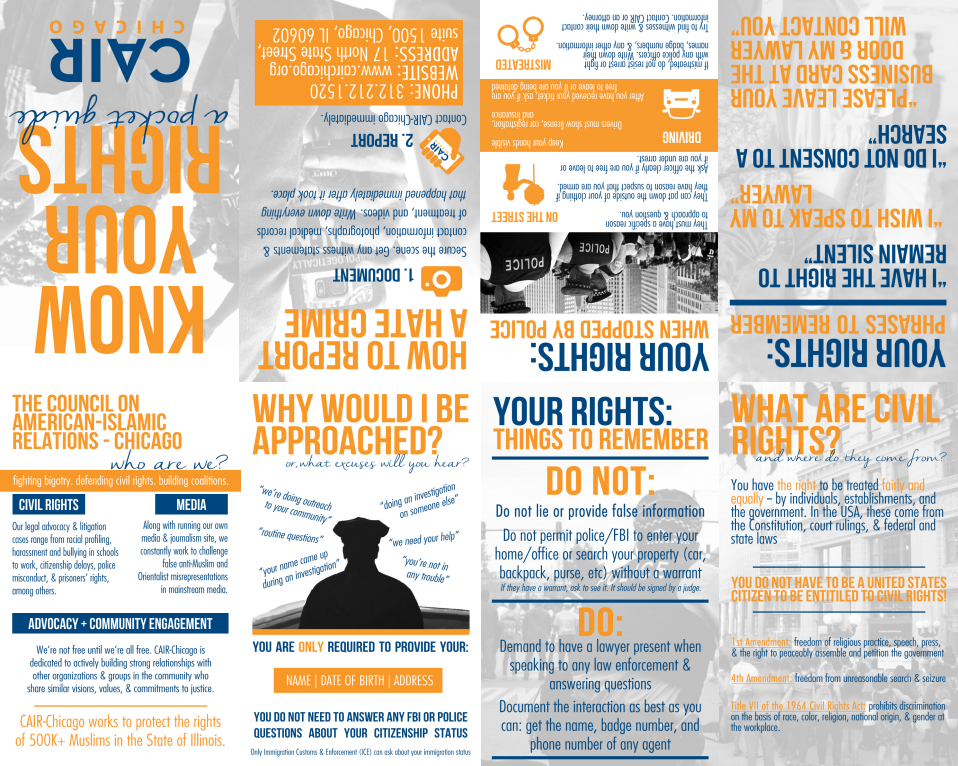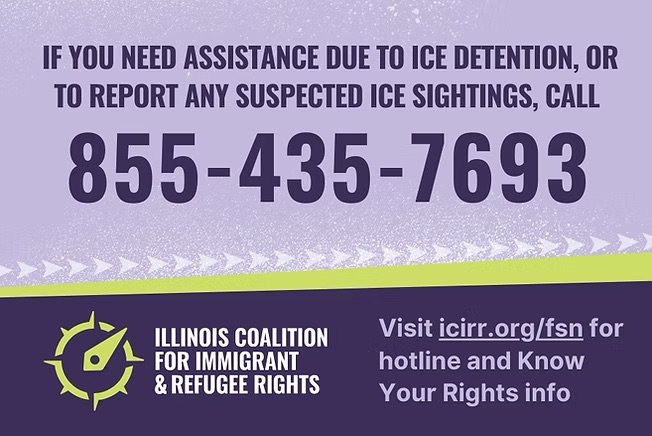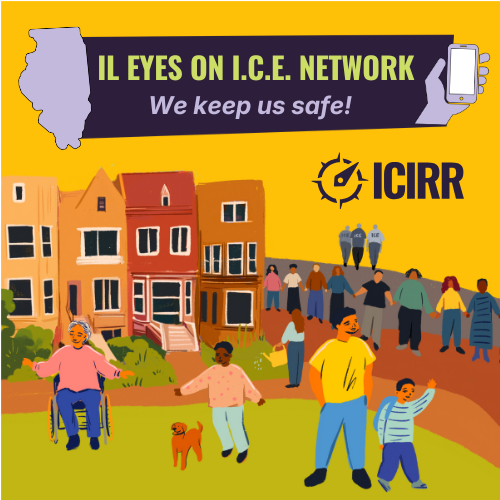2026 Know Your Rights & Essential Resources:
Navigating the New Administration from Travel, ICE, & Protest Guidelines
Updated December 2025

Traveler's Assistance Project
Worried About Travel Restrictions? Register Your Flight With Us BEFORE You Travel
Are you Muslim or Muslim-perceived and concerned that new Executive Orders could impact your travel? Fill out our online form with your flight details before you travel, and we’ll connect you with an on-the-ground lawyer to track your flight and provide immediate legal assistance if needed.
**Final destination MUST be Chicago, IL (O'Hare or Midway Airport). This service is exclusively available for arrivals into Chicago.
🔗 Traveler's Assistance Project: www.tapus.org
📞 For EMERGENCIES AT THE AIRPORT ONLY: TEXT (630) 930-2987
📧 Email: hmusabji@cair.com
-
Know your rights:
You have the right to remain silent when questioned or arrested by immigration officers
You may ask what agency they represent, and what their purpose is. You can ask officers whether they are immigration agents and why they are there.
You have the right to ask for an interpreter and to have documents translated.
You have the right to speak to a lawyer
What you can say:
I KNOW AND HAVE THE RIGHT TO EXERCISE MY RIGHTS
YOU CANNOT ENTER PRIVATE PROPERTY WITHOUT A VALID JUDICIAL WARRANT
IF YOU HAVE A VALID JUDICIAL WARRANT, SLIDE IT UNDER THE DOOR
IF YOU DO NOT HAVE A VALID JUDICIAL
WARRANT, YOU DO NOT HAVE THE RIGHT TO ENTER MY HOME OR PRIVATE PROPERTu
I WILL NOT ANSWER ANY QUESTIONS AND I WILL CALL MY ATTORNEY
Remain calm and keep your hands where the officer can see them
DO NOT:
Discuss your immigration or citizenship status with the police, immigration agents, or other officials
Sign anything you do not understand. You should state that you wish to speak with an attorney
Post unverified information on social media
Interfere with the investigation or otherwise put yourself in harm’s way
If an officer knocks on your door at home: Do NOT open the door. Teach your children not to open the door.
ICE officers must have a warrant signed by a judge to enter your home. ICE “warrants” are not signed by judges; they are ICE forms signed by ICE officers and they do not grant authority to enter your home without your consent
If you are outdoors and think you see immigration officers nearby:
Move to a safe indoor space
If you are a U.S. citizen and feel safe to do so, record the activity with your phone or write down any relevant information about what you witness— ALWAYS being careful to not interfere or otherwise obstruct the operation
-
You have the right to remain silent
Do not sign any documents
Call a CAIR-Chicago attorney at 312-212-1520 or any other attorney before answering questions
You do not need to provide personal information about birth, entry, or citizenship status
All valid warrants must be signed by a judge
• Warrant must contain correct name and address
• Warrant must specify a valid date
• Administrative warrants do not allow home entry
To verify whether a warrant is judge-signed, follow these steps:
Check the Signature: Look for the judge’s signature on the warrant. It should be an original signature or an official electronic signature, depending on the jurisdiction.
Judge’s Name and Title: The warrant should include the judge’s full name and title, confirming their authority to issue it.
Court Seal or Stamp: Many official warrants will include a court seal or stamp to authenticate the document.
Warrant Details: Ensure the warrant includes the correct legal basis, description of the person or property involved, and is dated properly.
Contact the Issuing Court: If in doubt, contact the courthouse that issued the warrant and request verification.
Attorney or Legal Representative Review: If you have legal representation, consult with your attorney to confirm the validity of the warrant. If you do not have legal representation, contact an attorney at CAIR-Chicago or any trusted immigration organization/law firm.
IF THE FBI CONTACTS YOU:
Your right to be politically active and to hold different beliefs/views is protected by the Constitution. If you are visited by the FBI, remember:
You do not have to talk to the FBI. You have no obligation to talk to the FBI, even if you are not a citizen. Never meet with them or answer any questions without an attorney present. Refusing to answer questions cannot be held against you. It does not imply that you have something to hide.
You do not have to permit them to enter your home or office. FBI agents must possess a search warrant in order to enter your house. If they say they have a warrant, demand to see it before allowing them to enter. Even if they have a warrant, you are under no obligation to answer questions.
Never lie or provide false information to the FBI. It is better to refuse to answer any questions. Lying to an FBI agent is a crime. Contact CAIR for advice.
-
By CAIR California, Los Angeles:
ICE is a branch of the U.S. Department of Homeland Security (DHS) that enforces immigration laws within the U.S. and engages in arrests, raids, detentions, deportations, and removal proceedings. ICE agents often work with other law enforcement agencies, including the police.
On President Trump’s first day back in office, his administration rescinded an existing policy that protected “sensitive areas” from immigration enforcement, meaning ICE agents can now conduct arrests in places such as houses of worship, schools, and hospitals.
Rolling back this policy is intended to create fear and make immigrants feel less safe in their communities. Even with these new permissions, ICE agents can still only enter a masjid or other private space with consent or a valid judicial warrant.
Here are six things to keep in mind if ICE shows up at your masjid:
1. Know Who Is at Risk
Certain groups are at higher risk from ICE agents, including noncitizens without immigration status and noncitizens who have violated the terms of their immigration status.
Generally, ICE prioritizes people who:Have certain types of criminal convictions.
Have prior orders for deportation.
Are believed to be a threat to national security.
2. Do Not Give ICE Agents Consent To Enter
ICE agents do not have the right to enter a private space, such as a masjid, without consent or a valid judicial warrant. If they do show up, do not allow them entry. Consider saying, “I do not give you permission to enter my masjid, and I do not wish to speak to you. I do not give you permission to be at my masjid. Please leave.” Masajid should designate one or two authorized individuals to deal with any ICE agents if they show up.
ICE agents may try to argue that certain spaces of the masjid are open to the public and, therefore, no warrant is required. Masajid should consider putting up signs clearly stating that the entire masjid is private property.
3. Look Out for Tricks or Intimidation
ICE almost never has a judicial warrant necessary to enter private spaces—be wary of ICE agents tricking, lying, or intimidating you into giving consent to enter the masjid.
Agents may try to use internal documents titled “warrant” from the DHS as proof of a warrant, but this does not grant them access. Only judicial warrants from a courthouse with a judge’s signature allow ICE agents to enter the masjid.
4. Review All Warrants Carefully
If ICE does have a signed judicial warrant to enter, first make sure to ask the agents to provide identification and ask to review the warrants. Carefully review it to see where officials are allowed to search and what can be seized.
The masjid should also arrange for someone to accompany the ICE inspector at all times while they are on the premises to ensure agents are abiding by the parameters of the warrant. Remember, you have the right to document and record interactions with ICE agents.
5. Know Your Rights as an Individual
As an individual, you have the right during ICE interactions to:
Remain silent. You do not have to answer any questions, including about your immigration status.
Speak to a lawyer. You have the right to consult an attorney before speaking to ICE agents. You should never sign anything without first speaking to a lawyer.
Request a phone call. You may contact your country’s consulate if you are a foreign national.
6. Seek Help from CAIR
CAIR offers high-quality, free immigration and civil rights legal services to the community. If you believe your rights have been violated or have additional questions about what to do if your masjid is approached by ICE agents, contact your local CAIR office for assistance.
-
If you encounter an immigration or police officer at your workplace:
Immigration agents can enter public workplaces. If you work in a place open to the public, like a restaurant or car wash, immigration agents may enter the public space of your workplace as they please (i.e. waiting area or lobby).
Immigration agents cannot enter private areas unless they have permission or a warrant. ICE cannot enter any non-public space of your workplace (e.g. kitchen) unless they have either a valid warrant signed by a judge or permission from your employer to enter a private area of your workplace.
You have the right to refuse consent to be searched. If agents attempt to search your property, bags, or pockets, you can say aloud “I do not consent to a search.”
You are not required to answer questions. If asked about where you were born, your immigration status, or your immigration history, you may choose to remain silent or say, “I do not want to answer your questions.”
You do not have to sign anything before consulting with an attorney. You do not have to sign anything, and you have the right to consult with an immigration attorney before making any decisions or signing anything.
Do not run or resist arrest. In the event you are detained, stay calm and do not attempt to resist arrest.
-
What to tell your children:
Let your children know that if ICE/Border Patrol comes to their schools, they do not have to answer questions - even if an adult tells them it's okay to talk.
Tell them not to share any information about their family or any friends’ families
They shouldn’t answer ANY questions about what country they’re from, if they were born in the US, if they have papers
-
Establish a safety plan that your family can use if ICE arrests you. Key parts of a safety plan include:
Choose emergency caregivers and talk to them
Memorize your emergency contact phone number
Update your child’s pickup permissions with their school
Document medical conditions and medications
Ensure children have passports
No court involvement required for short-term guardianship (up to 365 days)
Can be signed by parent and guardian with two witnesses
Revocable at any time by parent
Additional Resources:
Tell your loved ones that if you are detained by ICE, they can try to use ICE’s online detainee locator to find you: locator.ice.gov
National Immigrant Justice Center’s Legal Deportation Assistance immigrantjustice.org
Organized Communities Against Deportations’ Resource Guide organizedcommunities.org
For more information on short term guardianship visit Illinois Legal Aid Online
-
Be cautious of individuals offering legal services or legal advice. Only licensed attorneys can practice law. Common immigration scams involve individuals who claim to be “immigration consultants” or “Notarios” who often lack the legal qualifications to give legal advice. Fraudulent practices exploit members of immigrant communities by charging unnecessary fees, delaying the immigration process, and can also put people at risk of deportation.
Beware of notarios. Notarios in the U.S. are NOT attorneys.
Be wary of anyone who ‘guarantees’ that they can get you a specific benefit, like a visa or green card.
Be wary of unexpected fees. Note that there is no fee to download forms. Always request a receipt for any payment made to your attorney or representative.
Be wary of signing forms. Never sign blank forms, and keep copies of all forms and documents submitted to the government for your own records.
On warrants: Administrative Warrant - It is issued by ICE or DHS for civil immigration violations. An administrative warrant does not allow ICE to enter private residences without consent. It is signed by an ICE officer, not a judge, and labeled as Form I-200 or Form I-205. Unlike judicial warrants, it cannot be enforced in the same way and does not grant ICE entry rights without permission.
For more information, see Common Scams | USCIS. If you are a victim of immigration fraud, you can make a report to the following:
Attorney General of Illinois : call 1-800-386-5438 and Spanish Language Toll Free Hotline:1-866-310-8398
City of ChicagoDepartment of Consumer Services : call 311 (Chicago Police non-emergency)
-
-
City of Chicago- Office of Immigrant & Refugee Rights —> Resource Hub
Know Your Rights Resource Guides in Mandarin, French, Spanish, English, Haitian Creole, and Ukrainian —> https://drive.google.com/drive/folders/192ttRR9-SRMxBcZmyQKdfukRr7HLiUC6
Chicago Phone # : Call ICIRR’s Hotline 1-855-HELP-MY-FAMILY (1-855-435-7693)
IDHS Office of Welcoming Centers for Refugee | (312) 793-7120 | https://www.dhs.state.il.us/page.aspx?item=146538
The Resurrection Project - Immigrant Justice | (312) 666-1323 | https://www.trpimmigrantjustice.org/
Printable Know Your Rights Card & One Pagers
Muslim For Just Futures KYR Posters
ICIRR: KYR When Encountering ICE
City of Chicago Office of Immigrant, Migrant, and Refugee Rights (IMRR)

Flying & Travel Tips
What Every Muslim Needs To Know
🚨 President Trump has just signed a renewed travel ban effective June 9th—blocking entry from 19 Muslim-majority and African nations.
This discriminatory order echoes the original Muslim Ban and comes as ICE agents are raiding Chicago neighborhoods like Pilsen and the South Loop.
✈️ Traveling for Hajj 2025?
With increased reports of Muslim travelers being stopped, questioned, or having their devices searched at airports, it’s more important than ever to travel informed and protected.
🔒 Follow our digital safety tips
🛂 Know your rights at the border
📝 Register at TAPus.org at least 24 hours before arriving at O’Hare or Midway
📋 Fill out your immigration intake: cairchicago.org/get-immigration-help

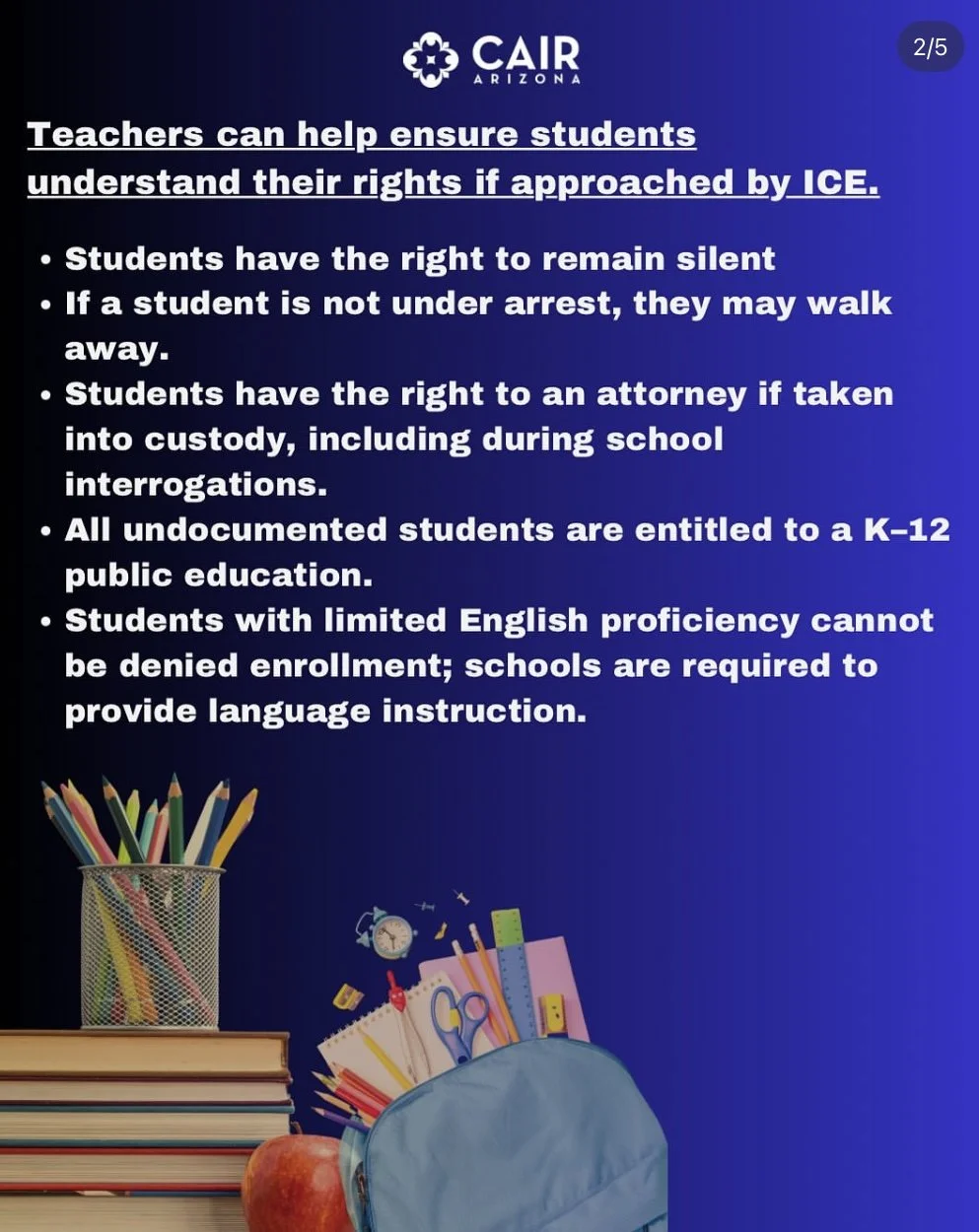
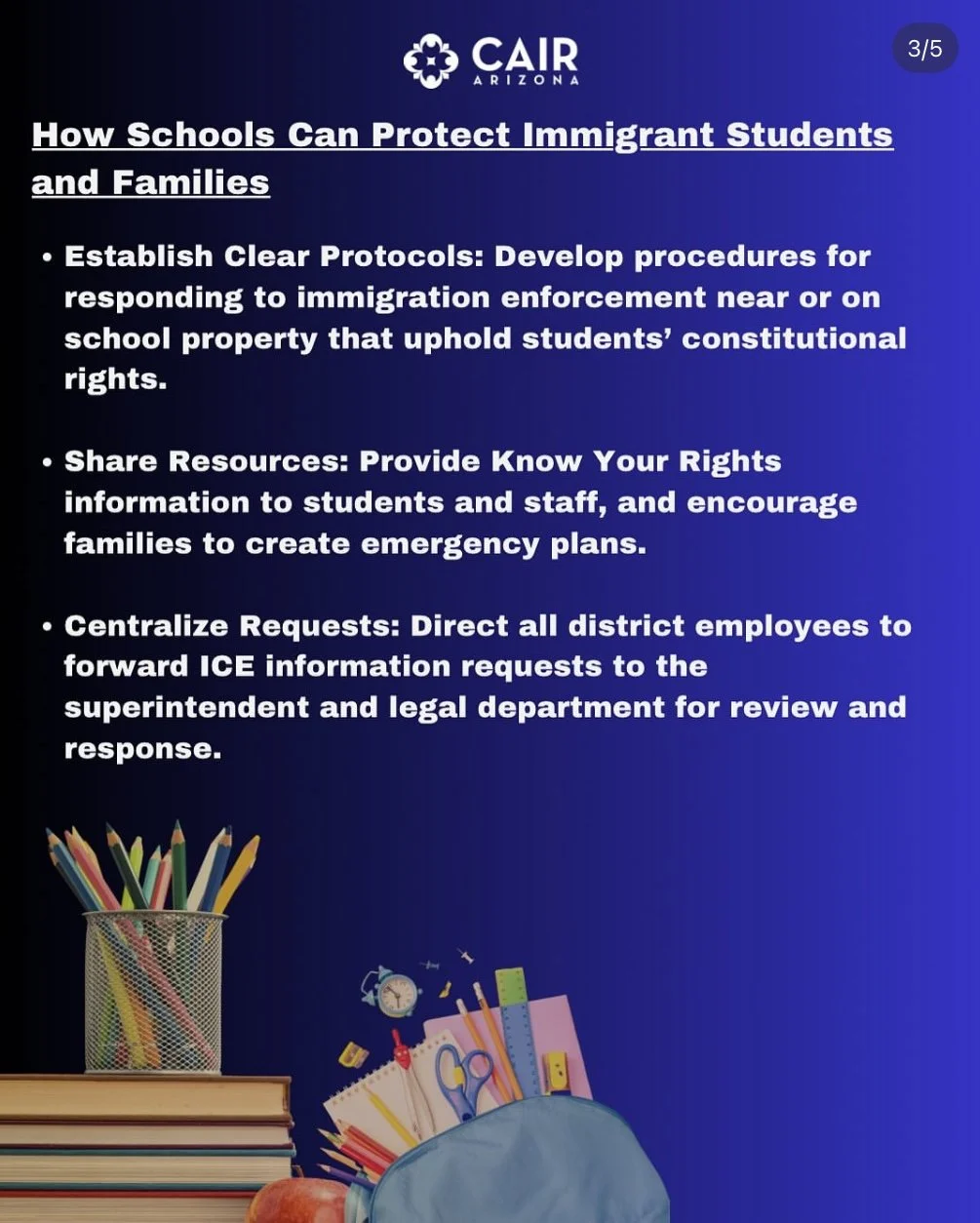
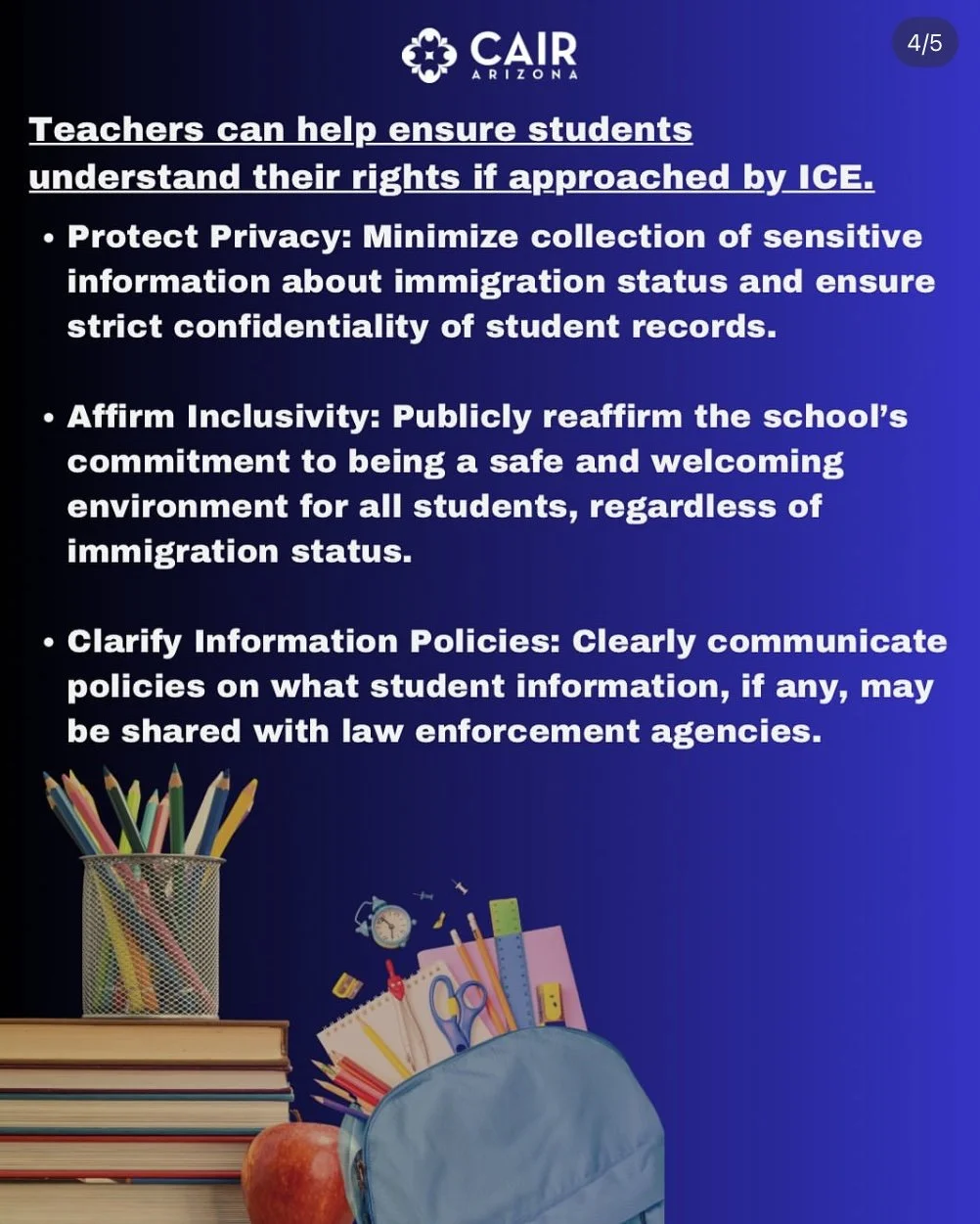
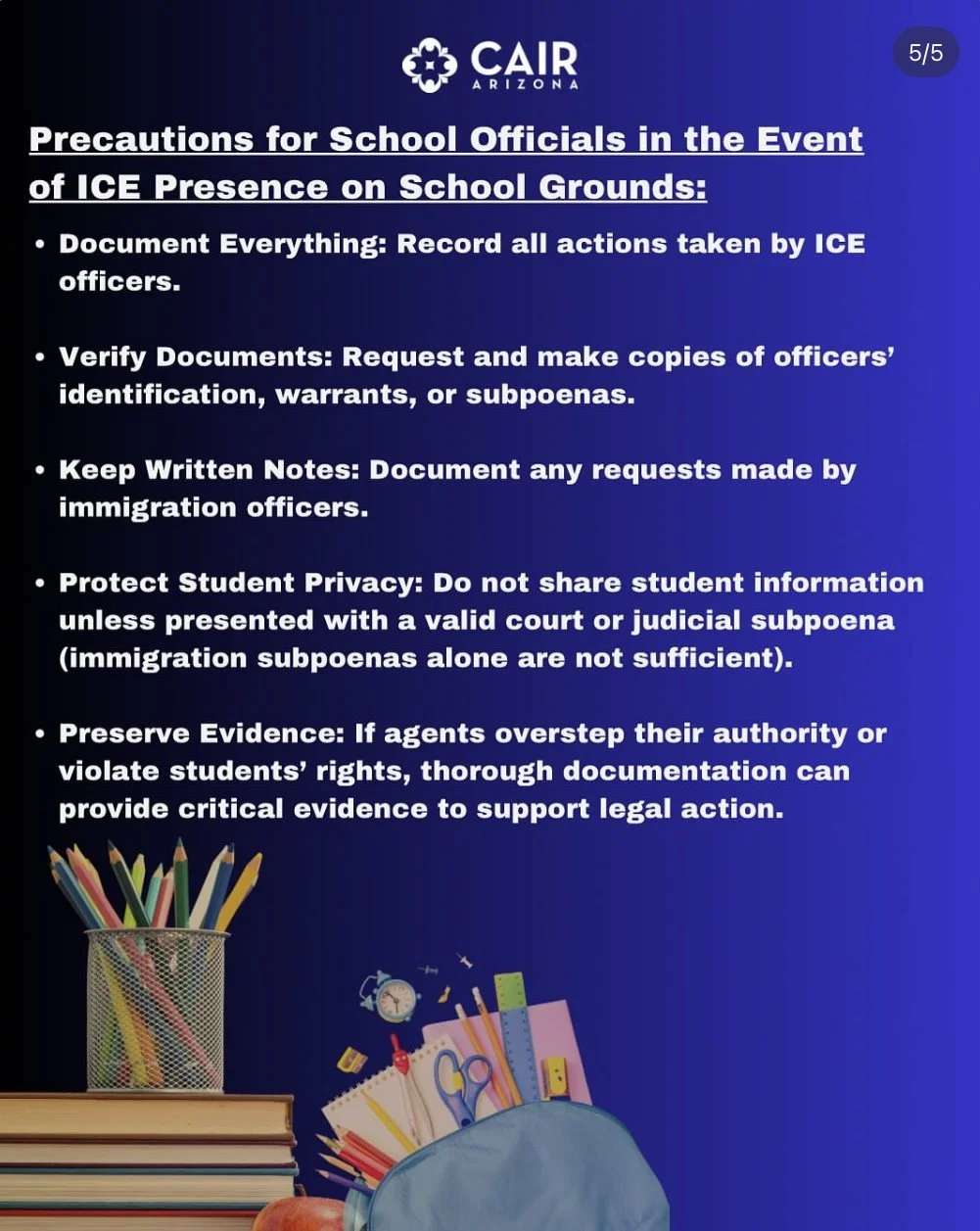
Report ICE Sightings & Detention Help
If you believe you are witnessing ICE activity, please call ICIRR’s 24-Hour Family Support Hotline at 1-855-HELP-MY-FAMILY (1-855-435-7693) to report it.
Know Your Rights
Mosque KYR Posters: CAIR’s masjid poster project. Free, ready to use kit for masjids featuring a set posters with critical rights when approached by law enforcement and a QR code to report violations.
Rapid Response Alert Groups by Neighborhood/Chicagoland area
Follow the Chicago United Families Coalition (CUFC) on Instagram @familieschicago
Get daily updates on local ICE activity and connect with trusted rapid-response groups ready to support our immigrant communities.
-
-
-
Description text goes here
-
-
-
-
-
-
-
-
-
-
-
-
-




